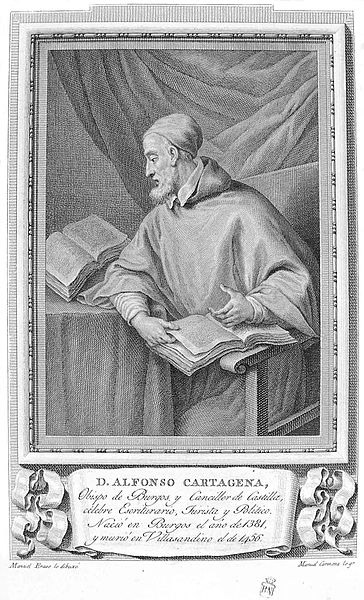Contemporary scholarship has endorsed with increasing frequency the claim that sincere and fervent converts from Judaism to Christianity on the Iberian Peninsula developed a distinctive Converso theology. By this account, Converso theology, even as it completely accorded with Catholic faith and ritual, also emphasized the positive and central role played by Jews and Christians of Jewish descent in the history of Mankind's Salvation, as represented by figures like the Virgin Mary, Jesus Christ and St. Paul. Converso theologians have been recognized for diminishing the responsibility of the Jews in the crucifixion, claiming that Romans were also to be blamed. Moreover, the crucifixion was described as part of God's plan to redeem humanity, a reading based on St. Paul's Epistle to the Romans, chapter 11.
Alonso de Cartagena (1384-1456), the distinguished Bishop, diplomat, historian, courtier and precursor of Spanish humanism, was one of the major figures among these Converso theologians. As the second son of the converted Rabbi Salomon Halevi of Burgos / Pablo de Santa Maria, he was baptized with his father and his brethren at the age of five, and became one of the most illustrious members of the Santa Maria clan that included writers, historians, soldiers, courtiers, theologians and churchmen. Cartagena continued his father's path as Bishop of Burgos and also elaborated on the idea that Santa Maria family were scions of both the tribe of Levi and of the Virgin Mary. His Converso theology was mainly expressed in his Defensorium unitatis christianae (1449-50): a tract that successfully reacted against anti-Converso measures adopted by 1449's Toledo rebels. Cartagena, elaborated on the Pauline-based theological-political concept of the "Mystical Body" (Corpus Mysticum), claiming that Conversos are to be considered as full members of the Church, and that any attempt to segregate them on an ethnic or racial basis is an un-Christian "pagan heresy." Nonetheless, a close reading of Cartagena's writings shows that he had difficulties reconciling theological views such as St. Paul's ideas on inclusive Christian equality "neither Jew nor Greek" Galatians 3:28) with beliefs in collective common traits (e.g., the mildness of the Jews vs. the courage of the Goths), as well as regarding St. Paul's recognition of Jewish Christ believers as a distinct part of the Christian body (I Corinthians 12:12-14).
